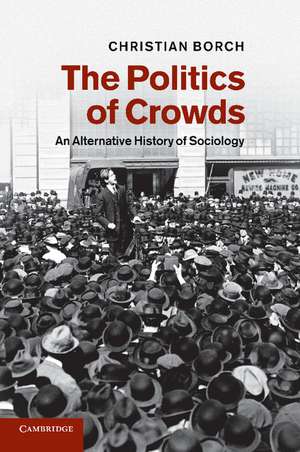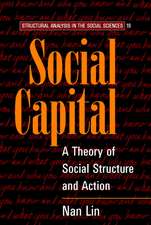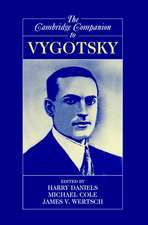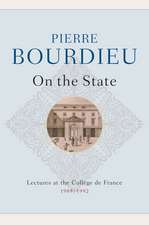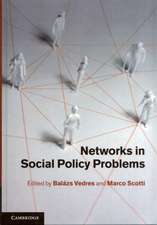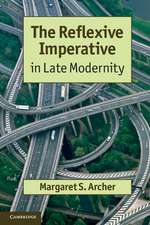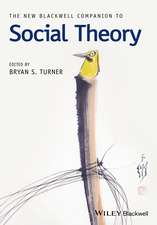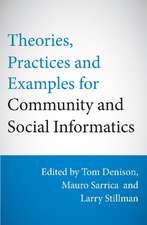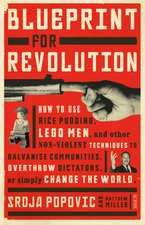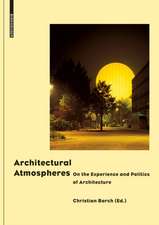The Politics of Crowds: An Alternative History of Sociology
Autor Christian Borchen Limba Engleză Paperback – 18 sep 2013
| Toate formatele și edițiile | Preț | Express |
|---|---|---|
| Paperback (1) | 327.79 lei 6-8 săpt. | |
| Cambridge University Press – 18 sep 2013 | 327.79 lei 6-8 săpt. | |
| Hardback (1) | 700.20 lei 6-8 săpt. | |
| Cambridge University Press – 11 apr 2012 | 700.20 lei 6-8 săpt. |
Preț: 327.79 lei
Nou
62.72€ • 67.07$ • 52.30£
Carte tipărită la comandă
Livrare economică 17 aprilie-01 mai
Specificații
ISBN-10: 1107625467
Pagini: 348
Ilustrații: black & white illustrations
Dimensiuni: 152 x 229 x 20 mm
Greutate: 0.51 kg
Editura: Cambridge University Press
Colecția Cambridge University Press
Locul publicării:New York, United States
Cuprins
Introduction: the crowd problem; 1. Setting the stage: crowds and modern French society; 2. Disciplinary struggles: the crowd in early French sociology; 3. Weimar developments: toward a distinctively sociological theory of crowds; 4. Liberal attitudes: crowd semantics in the USA; 5. From crowd to mass: problematizing classless society; 6. Reactions to totalitarianism: new fusions of sociological and psychological thinking; 7. The culmination and dissolution of crowd semantics; 8. Postmodern conditions: the rise of the post-political masses; Epilogue: the politics of crowds.
Recenzii
'A truly fascinating, learned and deeply thought-provoking reminder of the importance of crowd theory to the discipline of sociology. [The] Politics of Crowds persuasively explains why the 'problem of crowds' would have arisen in both the general and the academic culture of the 1880s, threatened to overwhelm the social sciences through the mid-twentieth century, and then (most fascinating of all) ebbed away again.' John Plotz, Brandeis University
'As The Politics of Crowds usefully reveals the persistent and hidden presence of crowd in social theory and the tensions that are intrinsic in such uncomfortable presence, one cannot but concur with its author in his final call: 'let the spectre of crowds once again haunt sociological thought!'. In short, this almost amounts to a renewal of sociology's own program.' Andrea Mubi Brighenti, University of Trento
'The book traces a series of modifications of 'crowd semantics': disciplinary frontiers, intradisciplinary struggles and historical conditions are brought together to account for the rise and decline of crowds as analytical objects of predilection for sociological research.' Claudia Aradau, Radical Philosophy
'Far more than an essay on the concept of the crowd, [The Politics of Crowds] is a virtual encyclopedia of scholarship and debate about the concept, well documented, clearly written, and full of insight and clarification.' Christopher Kelty, Institute for Society and Genetics, University of California, Los Angeles
'We have here a study that indeed provides novel insights for both the history of sociological thought as well as for the sociology of modernity, given that the book covers major experiences of late-nineteenth- and twentieth-century European and North American socio-political life and their interpretations by concerned, scholarly informed and often politically motivated actors. The book delivers a narrative that may defy some concerns of methodology or intra-disciplinary positioning, as the author is well aware, but that increases our understanding of both the sociological enterprise and the world we live in. As such, it is without doubt a remarkable achievement.' Peter Wagner, ICREA and University of Barcelona
'In this authoritative, extremely learned and well organized book, Christian Borch, who is Associate Professor of Political Science at the Copenhagen Business School, traces the development of a specific 'crowd semantics' that cuts across the history of sociology since its inception … Borch makes a powerful argument that, despite their being increasingly marginalized or reconfigured, crowds have remained as sort of indelible residuum of all sociological theories and categories that form the backbone of twentieth-century sociological lexicon.' Journal of Cultural Economy
Descriere
When sociology emerged as a discipline in the late nineteenth century, the problem of crowds constituted one of its key concerns. It was argued that crowds shook the foundations of society and led individuals into all sorts of irrational behaviour. Yet crowds were not just something to be fought in the street, they also formed a battleground over how sociology should be demarcated from related disciplines, most notably psychology. In The Politics of Crowds, Christian Borch traces sociological debates on crowds and masses from the birth of sociology until today, with a particular focus on the developments in France, Germany and the USA. The book is a refreshing alternative history of sociology and modern society, observed through society's other, the crowd. Borch shows that the problem of crowds is not just of historical interest: even today the politics of sociology is intertwined with the politics of crowds.
